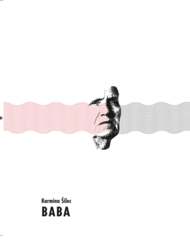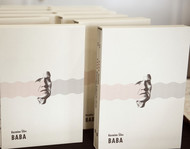BABA Colossal Balkan Fiction / Catalog
Book / 2021
Music preview
From the Press
Two most fascinating titles on the Slovenian book market this year question the roles of women dictated by the patriarchate, which at the same time made it possible to step out of it.
... in contrast to the catalog as a bureaucratic category ("a systematic list with certain data"), Karmina Šilec's Catalogis a fragmented, never-ending list of everything, similar to the inspirational lists in Borges's metafiction stories or, speaking of the Balkans, in the stories by Danilo Kiš. ...
...I would say that this by-product of the author's work on sworn virgins can compete with any dedicated attempt to systematize former Yugoslav mythology. But, best of all: she doesn't play the sentimentality and nostalgia card.. She simply makes an inventory of what remained because it is (was) so unique ...
...Conductor Karmina Šilec first researched the phenomenon of virdžinas(sworn virgins who take on the role of men) for musical purposes. Two extensive and fascinating books, Baba, Colossal Balkan Fiction and Baba, Catalog, are, so to speak, a by-product of this research. Baba is an original contribution to the study of the construction of trans-identities, as well as a fascinating book on all contexts of the project.
(Večer, Petra Vidali, 2021)
Karmina Šilec is a phenomenon. Awarded several times, worldwide. She is extremely musically talented, but also literary brilliant, as both books from the Baba project prove...
...It told a lot to me, so much and in such a way that no book has in a long time! It is topical right now, in the midst of the war that is a continuation and repetition of the same thing: women are still oppressed, it is women and their children who are paying, again and again, the ultimate price of the phallocentric male struggle for power and authority. "This book is a mirror of limitations and choices." Mine too, and yours...
...Written to sound like a documentary narration, they are woven with Karmina's genius creativity from the fragments she has catalogued in the Catalog. Just a glimpse: "Stana has been a murderer, albeit an innocent one, ever since he came into the world. His mother died in childbirth and this stole his childhood. With his coming into the world, his father’s joy dried up as if cut off. Stana didn't have any brothers and he was guilty of that too.
Life and death collided at his birth.
Stana didn’t have any brothers, and he was guilty of that too.
(…)
Her story will go through time and across the country."
...Both the Catalogue and Colossal Balkan Fiction should be used to teach creative writing, to practice scriptwriting, and above all for a dance of fragments that Karmina's surplus creativity transforms into a whole, unlike anything we have ever read before. My compliments!
(Manca Košir, Bukla, 2022)
... all three books surprise with a perfect style, a skillful synthesis of diverse genres, a vivid outline of the protagonists and events, and a precise measure of symbolism and metaphoric language, which is used as irony, rather than in the sense of mystification. Considering its sensibility, empathy and genuine personal involvement, despite the extremely broad and diverse narrative, this is a kind of embroidered literary mosaic, which is a complete whole and yet leaves the reader the possibility of endless variations and interpretations ...
... all this intertwining of facts, historical fragments, legends, rumors, documentary sources, impressions, imaginary inputs and observations, which sometimes only vaguely correspond to the central theme, is in its colorfulness, dynamics, charming inconsistency and irrationality already somehow 'Balkan' in itself ...
... in fact, this work is an almost ideal synthesis of intellectual curiosity, academic discipline and precision… as well as of passionate affinity and intimate understanding of the environment ...
... the trilogy goes far beyond a mere fascination with an unusual ethnological and anthropological phenomenon, it is also not a question of cold descriptiveness on the one hand or exoticism of the theme on the other, but it is a comprehensive reflection on the Balkans ...
(Peter Rak, Delo, 2021)
One of the qualities of the book is that it never breaks the boundary of being too autobiographical. The narrative is first-person all the time, yet the explicitly personal and intimate is dosed very discreetly.
(Melita Forstnerič Hajnšek, Večer, 2021)
... It is definitely an impressive work that delves into the unknown to us and may not meet expectations. Acctually it will definitely surpass them....
... We can understand book as an extremely deep work on the history of this institution and at the same time a fictional reality of the whole project. Everything is impressive, from the instructions on making of coffee in a dezva to reading individual stories. Karmina Šilec has created a reading in which we can read superficially and enjoy it, or we can delve into it in its entirety and barely find a way out of what we have read.
......Ten completely diverse stories that are so authentic as well as connected. You could easely believe that they are complitelly true and maybe they acctually are, but with other qualities. All is really a mirror of our society today or yesterday or tomorrow. One story will be closer to emotions than another and that is the charm of book composed up of several short stories. You don’t know what you’re going to get and how you’re going to feel. If you don't like it, it's still here the next one and so on. Perhaps the word "story" itself is too powerful, as there are about ten records on each of the sworn virgin that follow each other in chronological order. All is so perfectly written that you know exactly what’s going on and because of the end of each of the story, it’s the latter that makes them so similar and so unique at the same time.
(Žiga Kastelic, Študent)
book is translated to English


